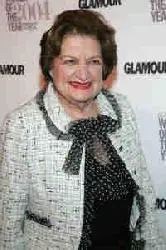Legendary White House correspondent Helen Thomas died Saturday at her apartment in Washington D.C. She was 92. Thomas, who’s widely known for breaking gender barriers in journalism, emerged as one of the most prominent White House reporters at a time when the profession was dominated by men.
Thomas, is Lebanese and covered every presidential administration in the United States from Dwight Eisenhower to John F. Kennedy to Barack Obama for the United Press International and Hearst Newspapers.
She’s written five books and was the first female member of the National Press Club, White House Correspondents’ Association and the Gridiron Club which announced her death.
Her ability to vigorously question U.S. Presidents and other high power officials distinguished her from others in the profession. While most journalists shunned at asking the tough questions, Thomas never shied away controversial subjects or at expressing unpopular views.
She made it clear at White House press conferences that she opposed the Iraq war, while journalists around the country were being criticized for not asking enough hard questions about the 2003 U.S. led invasion.
Thomas traditionally sat at the front of presidential news conferences, but during the Bush Administration she was moved to the back row. When she was once asked why she was seated in the back row, she responded, “They didn’t like me, I ask too mean questions.”
As a senior correspondent at the White House Thomas ended dozens of presidential news conferences with her familiar phrase, “Thank you, Mr. President.”
In 2010 Thomas retired from Hearst Newspapers after making controversial remarks about Israel, Jews and Palestine. Afterwards she made more controversial remarks at workshop on anti-Arab bias in Dearborn.
The day after, her alma mater Wayne State University revoked the Helen Thomas Spirit of Diversity Award, and the Society of Professional Journalists also removed the Helen Thomas Award for Lifetime Achievement.

|
| Thomas. |
The decisions caused major backlash from groups and individuals across the country who called on SPJ and WSU to reinstate both awards, saying the decisions were an attack on free speech, and undermined the principals of journalism. Several organizations that included youth groups held protests putting pressure the university and SPJ to reverse their decisions.
Still even after she was forced to resign and her awards were removed the brave and outspoken Thomas would continue fighting for what she believed in, and at an event held by the Palestine Cultural Office she delivered a speech in support of Palestinian rights.
At the event when asked by The Arab American News whether she would take back her remarks about Israel she said, “Never, I spoke the truth, I don’t believe in human tyranny, which is what is happening in Palestine.”
Thomas was married to Douglas Cornell, who was a White House reporter for the Associated Press and passed away in 1982. She graduated from WSU in 1942 and is among its most distinguished alumni.
Thomas’ family issued the following statement:
It is with saddened hearts that we inform you of the passing of our sister and aunt, Helen Thomas. Surrounded by family and friends, she died peacefully in her Washington, D.C. home Saturday morning, July 20, 2013.
Helen Thomas devoted her nearly 70-year career in journalism to the pursuit of the public’s right to know. She was a champion of the First Amendment fervently advocating for the freedom of speech and the freedom of the press. For years, she proudly occupied her front row seat in the Press Briefing Room at the White House, considering it the people’s chair in the people’s house. She always acknowledged the privilege of being the eyes and ears of the public, and she boldly and unabashedly asked the hard questions to hold our leaders accountable.
Helen Thomas began her career in the 1940s as a young woman working in a man’s business overcoming many institutional barriers that kept women from equal access. Through her tenacity, integrity, and willingness to follow-up any lead and work any hour of the day or night, she reached the pinnacle of her profession and paved the way for the next generations of women to follow.
Helen will be greatly missed by her three surviving sisters and her many nieces and nephews, cousins, and dear friends. We will always remember her for the passionate way she sought the truth, for her overwhelming love and generosity, and for her unfaltering faith in mankind.
Helen Thomas will be brought back home to Detroit, the beloved city of her youth, where she will be buried.






Leave a Reply